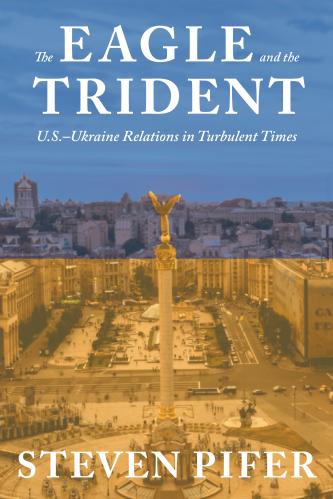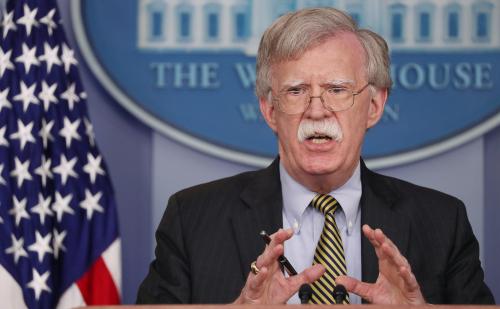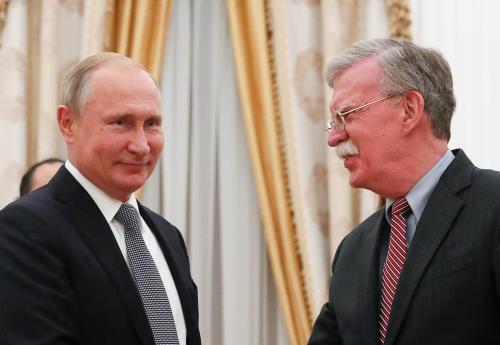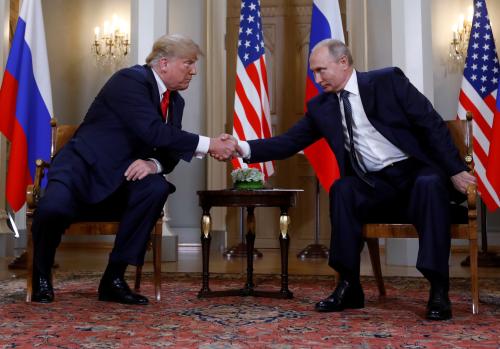In early February, the U.S. government will suspend its INF Treaty obligations, relieving Russia from performing its treaty obligations. The clock is ticking for Europe, writes Steven Pifer. This piece was originally published by the Spogli Institute for International Studies at Stanford.
On December 4, U.S. Secretary of State Pompeo announced that Russia has 60 days to come back into compliance with the 1987 Intermediate-range Nuclear Forces (INF) Treaty. Otherwise, Washington will suspend its obligations under the agreement.
The treaty’s future appears grim. The Kremlin has threatened countermeasures if the United States goes through with suspension, while Washington seems uninterested in preserving the treaty. If the treaty is to be saved, European leaders should act.
Up until recently, senior European officials said little publicly about the need for Russia to correct its violation of the treaty. They did not make that a major issue in their diplomacy with Moscow. In a recent discussion about the INF Treaty’s potential demise, a former U.S. government official even asked whether Europeans cared.
They should. While global in scope, the INF Treaty focused on enhancing European security. It resulted in the banning and elimination of U.S. and Soviet ground-launched missiles of intermediate range (500–5,500 kilometers), missiles that were deployed in large numbers between the Atlantic and the Ural Mountains in the 1980s.
While global in scope, the INF Treaty focused on enhancing European security.
Russia’s development and deployment of an intermediate-range, ground-launched cruise missile known as the 9M729 now constitutes a material breach of the treaty. U.S. officials have raised this violation with their Russian counterparts for some five years, all to no avail.
In October, President Trump said the United States would exercise its right to withdraw.
Many expected Mr. Pompeo to announce that the United States had given Moscow formal notice that it would withdraw from the treaty in six months’ time, as the treaty allows. A leaked memorandum prepared by National Security Advisor Bolton, no fan of the INF Treaty, said the notice should be conveyed by December 4 and that the Pentagon should develop a U.S. intermediate-range, ground-launched missile as soon as possible.
However, apparently reflecting discussions between Mr. Trump and German Chancellor Merkel in Argentina, Mr. Pompeo instead announced the 60-day period, after which the United States would suspend its INF Treaty obligations if Moscow does not return to compliance. U.S. suspension of its obligations would relieve Russia of its obligations to implement the treaty. The treaty would technically remain in force, but neither side would be observing its terms.
Russia has shown no sign of readiness to address its violation. Neither Mr. Trump nor Mr. Bolton appears interested in maintaining the agreement, while interest in the Pentagon in having an intermediate-range missile seems to be growing.
That bodes ill for the agreement’s prospects. If America’s European allies, whose countries derive the most security benefits from the treaty, wish to preserve it, they should try three things.
First, European leaders should engage President Putin directly and forcefully on this issue. He needs to hear from Ms. Merkel, President Macron, Prime Minister Conte and other leaders that the 9M729 poses a major problem for relations with his European counterparts.
To date, Mr. Putin has taken little direct heat over this question. If European leaders want to save the treaty, they should change that.
They do not have to ask Mr. Putin to admit the 9M729 is a violation. They can instead note that the missile poses an unacceptable threat to their countries and urge him to make a critical contribution to European security by eliminating that missile. He could do it as a confidence-building measure, without admitting guilt. They also need to make clear that, if Mr. Putin does not act, this will remain a difficult issue for him in the future.
Second, Europeans need to take a serious look at military steps to respond to the 9M729. Upping the political pressure on the Kremlin would prove useful, but military steps would carry far greater weight, especially at the Russian Ministry of Defense. Moscow never would have agreed to the INF Treaty in the first place had NATO not deployed Pershing II and ground-launched cruise missiles in Europe in the 1980s.
Are NATO allies ready to countenance deployment in Europe of a new U.S. intermediate-range missile? That would definitely grab the Russians’ attention, but it may be a bridge too far. European allies nevertheless could immediately begin a detailed and substantive discussion about military steps that NATO should and will take to offset Russia’s 9M729. The Pentagon is ready for that exchange. That said, it would have greater impact in Moscow if it were European governments and militaries that press the question of military countermeasures.
Third, European officials should recommend to Washington that, if the Russians change course and begin to deal seriously with Western concerns about the 9M729, the Pentagon should explore ways to address Russia’s concern that the Aegis Ashore missile defense launchers in Romania could carry offensive missiles. That does not pose an intractable problem. The United States could fix it, also as a confidence-building measure.
Would these steps succeed? Russia thus far has shown no readiness to abandon its investment in the 9M729. Saving the INF Treaty would prove an uphill struggle, but the fight is not yet over.
Do Europeans care? If so, Berlin, Paris, Rome, Budapest, The Hague and other European capitals will have to decide to make preserving the treaty an urgent priority in their relations with Moscow. If they do not care, the handwriting is on the wall. In early February, the U.S. government will suspend its treaty obligations, relieving Russia from performing its treaty obligations. The INF Treaty effectively will be dead.
The clock is ticking.
The Brookings Institution is committed to quality, independence, and impact.
We are supported by a diverse array of funders. In line with our values and policies, each Brookings publication represents the sole views of its author(s).









Commentary
Will Europe try to save the INF Treaty?
December 13, 2018